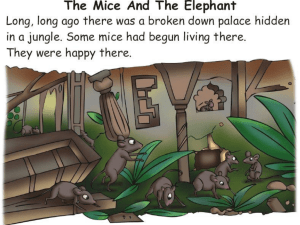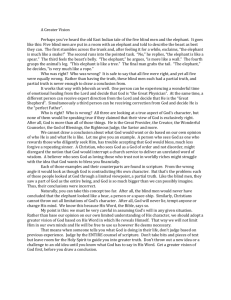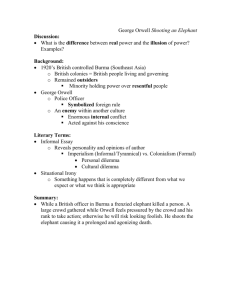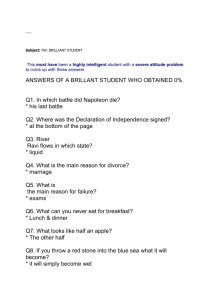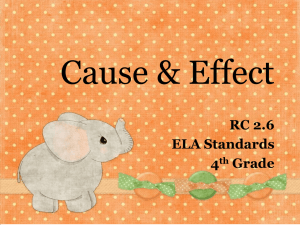26 flash cards - Cloudfront.net
advertisement
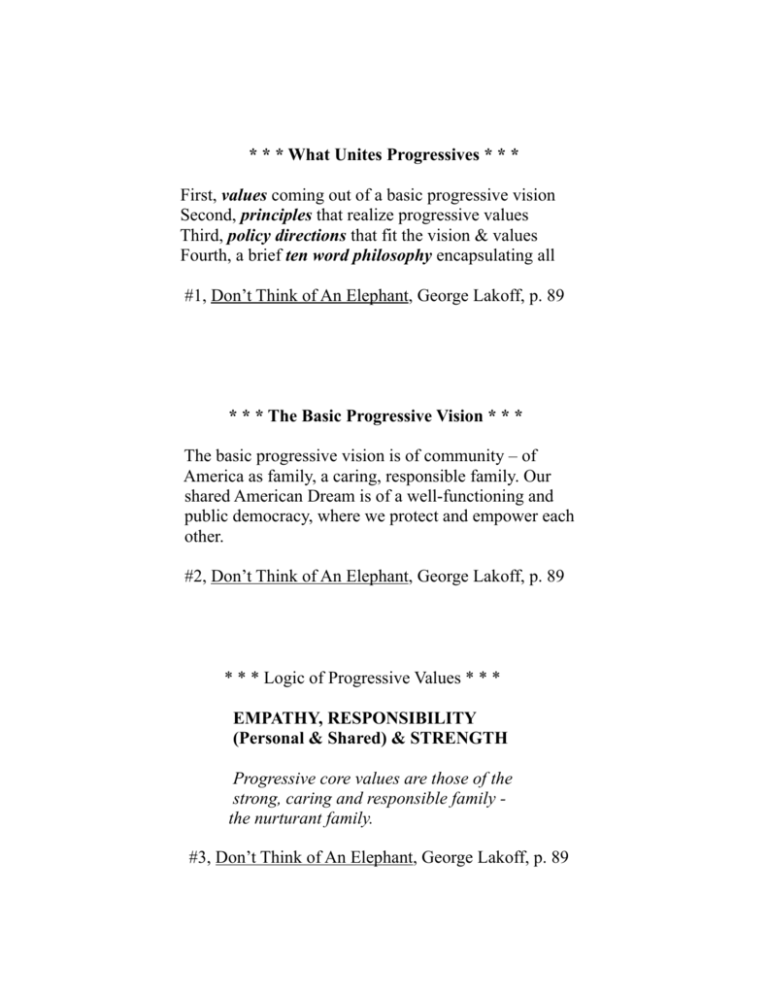
* * * What Unites Progressives * * * First, values coming out of a basic progressive vision Second, principles that realize progressive values Third, policy directions that fit the vision & values Fourth, a brief ten word philosophy encapsulating all #1, Don’t Think of An Elephant, George Lakoff, p. 89 * * * The Basic Progressive Vision * * * The basic progressive vision is of community – of America as family, a caring, responsible family. Our shared American Dream is of a well-functioning and public democracy, where we protect and empower each other. #2, Don’t Think of An Elephant, George Lakoff, p. 89 * * * Logic of Progressive Values * * * EMPATHY, RESPONSIBILITY (Personal & Shared) & STRENGTH Progressive core values are those of the strong, caring and responsible family the nurturant family. #3, Don’t Think of An Elephant, George Lakoff, p. 89 * * * Logic of Progressive Values * * * PROTECTION, FULFILLMENT IN LIFE, FAIRNESS When you care about someone, you want them to be protected from harm, you want their dreams to come true, and you want them to be treated fairly. #4, Don’t Think of An Elephant, George Lakoff, p. 89 * * * Logic of Progressive Values * * * FREEDOM, OPPORTUNITY, PROSPERITY Fulfillment in life comes from a life of freedom. This life of liberty is dependent on sufficient prosperity in our communities to provide the opportunities necessary to exercise our personal and shared responsibilities. #5, Don’t Think of An Elephant, George Lakoff, p. 89 * * * Logic of Progressive Values * * * COMMUNITY, SERVICE, COOPERATION Children are shaped by their communities. Shared responsibility requires serving and helping to shape your community. That requires cooperation. #6, Don’t Think of An Elephant, George Lakoff, p. 89 * * * Logic of Progressive Values * * * TRUST, HONESTY, OPEN COMMUNICATION Cooperation comes from trust. One builds trust by aligning one’s actions with one’s consistent, honest, and open communication of one’s values and vision. #7, Don’t Think of An Elephant, George Lakoff, p. 89 * * * Progressive Principles * * * EQUITY – Citizens and the nation owe each other equity. If you work hard; play by the rules; and serve your family, community and nation, then the nation should provide a decent standard of living, as well as freedom, security and opportunity. #8, Don’t Think of An Elephant, George Lakoff, p. 89 * * * Progressive Principles * * * EQUALITY – Do everything possible to guarantee political equality and avoid imbalances of political power. #9, Don’t Think of An Elephant, George Lakoff, p. 89 * * * Progressive Principles * * * DEMOCRACY – Maximize citizen participation; minimize concentrations of political, corporate and media power. Maximize journalistic standards. Establish publicly financed elections. Invest in public education. Bring corporations under stakeholder control, not just stockholder control. #10, Don’t Think of An Elephant, George Lakoff, p. 89 * * * Progressive Principles * * * The American Dream is of a well-functioning, effective public government. Private government, or business, provides services for a profit limited to those who can pay. Public government provides necessities without a profit to all its residents. Necessities include protection, greater democracy, more freedom, a better environment, broader prosperity, better health, and the building and maintaining of public infrastructure. #11, Don’t Think of An Elephant, George Lakoff, p. 89 * * * Progressive Principles * * * ETHICAL BUSINESS – The business of America is ethical business, whose soul is empathy. Public government provides necessities. Business provides services with a necessary profit. Ethical business have firm policies to protect and empower their fellow citizens through effective public government. #12, Don’t Think of An Elephant, George Lakoff, p. 89 * * * Progressive Principles * * * VALUES-BASED FOREIGN POLICY – Domestic policy values should apply to foreign policy whenever possible. (A) Protection translates into an effective military for defense and peacekeeping. (B) A strong, diverse community translates into strong alliances and effective diplomacy. (C) Caring and responsibility translate into caring about and acting responsibly for the world’s people; world hunger, health, poverty, and ecology; and rights for women, children, prisoners, refugees and ethnic minorities. #13, Don’t Think of An Elephant, George Lakoff, p. 89 * Policy Directions vs Specific Policies that Divide * MORAL ECONOMY – An economy centered on innovation, protection, and empowerment that creates millions of good-paying jobs and provides every American fair opportunity to prosper. #14, Don’t Think of An Elephant, George Lakoff, p. 89 * Policy Directions vs Specific Policies that Divide * SECURITY – Through military strength, strong diplomatic alliances, and wise foreign and domestic policy, every American will be safeguarded at home, and helping people around the world live better lives will strengthen America’s role in the world. #15, Don’t Think of An Elephant, George Lakoff, p. 89 * Policy Directions vs Specific Policies that Divide * HEALTH – Health care is a human right. Every American resident, without exception, shall have access to a state-of-the-art, affordable health care system. #16, Don’t Think of An Elephant, George Lakoff, p. 89 * Policy Directions vs Specific Policies that Divide * EDUCATION is a human right. Our education system shall be vibrant, well-funded and expanding with the highest standards for every child and school, where teachers nurture children’s minds and often the children themselves, and where children are taught the truth about their nation - its wonders and blemishes. #17, Don’t Think of An Elephant, George Lakoff, p. 89 * Policy Directions vs Specific Policies that Divide * EARLY CHILDHOOD – Every child’s brain is shaped crucially by early experiences. We support high-quality early childhood education. #18, Don’t Think of An Elephant, George Lakoff, p. 89 * Policy Directions vs Specific Policies that Divide * ENVIRONMENT – A clean, healthy, and safe environment for our children and ourselves: water you can drink and air you can breath. Polluters pay for the damage they cause. #19, Don’t Think of An Elephant, George Lakoff, p. 89 * Policy Directions vs Specific Policies that Divide * NATURE – The natural wonders of our country are to be preserved for future generations. #20, Don’t Think of An Elephant, George Lakoff, p. 89 * Policy Directions vs Specific Policies that Divide * ENERGY – Our world’s climate crisis requires us to make major investments in renewable energy, for the sake of millions of jobs that pay well, independence from oil, improvements in public health, preservation of our environment. #21, Don’t Think of An Elephant, George Lakoff, p. 89 * Policy Directions vs Specific Policies that Divide * OPENNESS – An open, efficient, and fair government that tells the truth to our citizens and earns the trust of every American. #22, Don’t Think of An Elephant, George Lakoff, p. 89 * Policy Directions vs Specific Policies that Divide * EQUAL RIGHTS – We support equal rights in every area-involving race, ethnicity, gender, and sexual orientation. Love, marriage & family lie at the very heart of full citizenship. If you can’t marry the person of your own choosing, you’re not a full citizen; if some people are not full citizens, then no one is a full citizen, and citizenship itself is insecure. #23, Don’t Think of An Elephant, George Lakoff, p. 89 * Policy Directions vs Specific Policies that Divide * PROTECTIONS – We support keeping and extending protections for consumers, workers, retirees and investors. #24, Don’t Think of An Elephant, George Lakoff, p. 89 * * The Ten Word Philosophy * * Progressives Stronger America Broad Prosperity A Better Future Effective Government Mutual Responsibility Conservatives Stronger Defense Free Markets Lower Taxes Smaller Government Family Values #25, Don’t Think of An Elephant, George Lakoff, p. 89 * * * Tax Fairness Key Concepts * * * 1) The Common Wealth Principle: We put together our common wealth to build an infrastructure that all can use — highways, public schools, the internet communications systems, the banking system, the SEC, the courts. 2) Compound empowerment means corporations and the wealthy make more and more use of the infrastructure provided by the common wealth. #26, Ask Rockridge Program Flash Cards Produced by The Empathy Surplus Project to foster the inward digestion and use of the latest insights of the brain and their impact on political conversations that matter. http://www.empathysurplus.com http://www.facebook.com/empathysurplus http://www.twitter.com/empathysurplus
